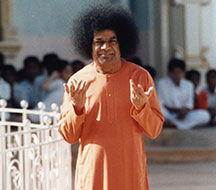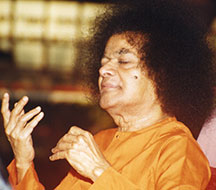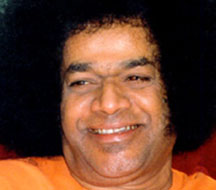
We should develop unwavering faith
Bangalore, Brindavan (Sevadal Conference )
Description
"Isa Vasyam Idam Sarvam'. This means that the ‘Eshwara’ is present in everyone and in everything. If we truly believe in what is said and if we have firm faith in these ideas then, we will never hurt or cheat or cause harm to others but we are just listening to these things and not putting them into practice. A great devotee of Shiva went to a Guru and he got a mantra from the Guru. What is that Mantra? It was 'Shivoham'. He was uttering frequently this mantra. On some other occasion another guru met this disciple and asked him, “Have you learnt any mantra? Are you repeating any Mantra?” This devotee told the guru, “Yes, I have learnt a mantra, I repeat the mantra always and the mantra is my life and everything to me, I repeat it constantly.” The Guru asked, ""Do you have complete faith in the mantra that you are reciting?"" This disciple said, “If I had no faith in the mantra, why would I make my whole life depend on the mantra?” The guru asked, “You say ‘Shivoham’ is the mantra, so what is its meaning?” The disciple said, “It means ‘I am Shiva’, I am Shiva’.” The Guru asked him, “Is it true?” The disciple said, “It is true and it is true at all times.” The Guru asked, “If you are Shiva what should Parvati be to you?” The disciple cried, “Blasphemy! Blasphemy!” Had he full faith in the mantra, he would have said that Parvati, is his wife and that she is his energy. He was just reciting the mantra. He neither had faith in the mantra nor did he believe in the truth of it. Such mantras though repeated any number of times and for whatever time, yield nothing as it is like pouring water in a pot which has a hole. We should chant in such a way that we strengthen whatever faith we have, and make it firm and strong. Moment after moment for small things we should not allow our faith to become less firm and shatter.
Chinna Kathas
-Faith
-

Story of Muthu Swami iyyer, the greatest lawyer of India
00:09:32There lived two brothers in a remote village in the then state of Madras. The elder brother was a virtuous person engaging in good thoughts and deeds. Their family was poor. The younger of the two was in bad company and was given to bad thoughts and deeds. It is easy to get into bad company whereas good company is not so easily available. A big boulder can be thrown down a mountain by merely pushing it, but it is a herculean task to take a boulder uphill. Similarly it is very difficult to rise to a high position, but is very easy to fall to ruin. The younger brother fell into bad ways due to the bad company that he kept. Instigated by the bad company, he developed hatred towards his brother. He sued his brother for possession of the house that was earned by his brother. The house was not an ancestral property. The younger one dragged his brother to court and made him suffer. The lawyers, tempted by the money offered, gave into the sinister motives of the younger brother and lost the case. The elder brother lost his claim to the property. The elder brother was pained to see the absence of truth and righteousness and brooded himself to death. He had a wife and a son. His wife took her son to Madras, determined to give her son a decent life. They suffered a lot without food and proper shelter. Overtime the wife earned meagre amounts as a labourer and started providing for her son. The son who was determined to give himself a better future bore many hardships; he ate in the charity giveaways and studied under the street lamps. He did not have even a pie to drink a cup of coffee. The boy got himself educated in spite of all the troubles and tribulations. Today’s ‘intermediate’ was called as “FA”. The boy passed the FA exam. The mother was very overjoyed to hear the news that her son had passed the exam and blessed her son whole heartedly. She said, “Son, your father died heartbroken due the prevalent injustice and unrighteousness. It appears even the Goddess of justice is against us. Justice doesn’t seem to exist in the world today. The educated are taking up the jobs to fulfil their selfish motives but not to uplift the justice or for the sake of the country. The lawyers are tempted by the money offered to argue even on the wrong side. There are so many lawyers who have ruined innumerable families like ours by their greed. But I am yet to see such a lawyer whose children are happy and living peacefully. I have only seen the children laying to ruins the earnings of such lawyers. In order to give peace to your father’s soul, you have to study LLB, take up the profession of a lawyer and uphold and uplift justice.” so saying she blessed her son. The son, thus blessed by his mother, in accordance with her wishes took up the study of law. With his mother’s words ringing in his heart and ears, he studied hard and passed the exam. Slowly he started his practise as lawyer with the aim to give peace to his father’s soul and to abide by his mother’s words. He thought that the blood that flowed in him, the food he ate, and the head- are all the gifts of his parents and hence must be offered to them. This is the real meaning of the saying,”Matrudevo bhava, (mother is god), Pitru devo bhava (father is God).” In order to please his parents he developed these good thoughts and good habits day by day. Good thoughts can never be destroyed. The good thoughts of man remain even after his death. Thoughts are very powerful, sacred and permanent. Sometime later India attained independence. After independence this boy became the chief justice of the high court of Madras state and he is Muththu Swami Iyer!! Shortly thereafter the mother died peacefully, happy that her son had become the chief justice of the high court. One can see how the sacred and noble aspirations of the mother and the son have borne fruit!! Muththu Swami Iyer attained great fame.
-

Swami narrating a story on Self-Confidence
00:05:19There was once a guru living in a place and he was communicating wisdom to people who used to come for his darshan. Those people who were coming to have his darshan used to bring some flowers and fruits in accordance with Indian traditions. One day, as the offerings were plenty in the form of fruit, he called a disciple and asked him to cut the fruit and arrange for its distribution as prasad. The disciple cut the fruit and reported to the guru that all was ready for distribution and asked him as to whom should be given the first fruit. The guru asked him to start with the person in whom he has the greatest faith and the highest confidence. All the people assembled there thought that the disciple would first give the fruit to the teacher and then distribute to the others. But the disciple did not do so. He took the first fruit himself. When the surprised onlookers asked for an explanation, he said that since he had the greatest confidence and affection for himself, he took the first fruit. This demonstrates that he had indeed, confidence in himself and that he truly loved himself. When we look at this story outwardly, it may look as if the disciple had no faith in the guru, but we should realise that he acted in this manner because of supreme confidence in himself. Therefore, if one does not touch the feet of God, does not go to a temple or does not go on a pilgrimage, we should not conclude that he has no faith in himself. Confidence in one’s self is something which can only be experienced and cannot be exhibited. What is important is that one should have faith in himself.
